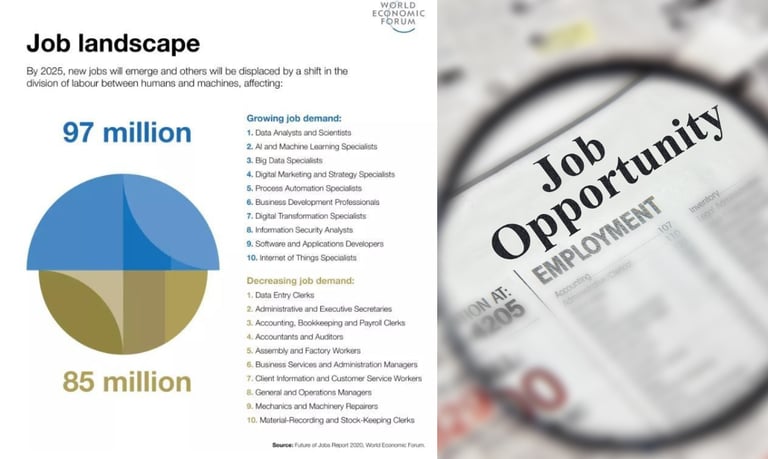Top 10 In-Demand Careers Shaping the Future of Work
FEATUREDPERSONAL GROWTH


The job market is changing faster than ever, driven by technology and new business needs. Are you ready for the careers of tomorrow? From data analysts to IoT specialists, these 10 in-demand jobs are shaping the future of work. Whether you’re starting out or pivoting your career, understanding these roles could be your key to staying ahead in a rapidly evolving landscape. Let’s break down what these roles are all about and why they matter.
The job market is undergoing a seismic shift. The World Economic Forum predicts that by 2025, 97 million new jobs will emerge, transforming how we work and live. Having seen these kinds of changes firsthand—from the days of early computerization to the rise of the internet—I know how disruptive and exciting these transitions can be. It’s clear that the future belongs to those who adapt and stay ahead. Here's a deep dive into the top 10 jobs set to shape the workforce of tomorrow and why they matter.
1. Data Analysts and Scientists
What they do: Data Analysts and Scientists collect, process, and analyze data to help organizations make informed decisions. They use statistical methods, algorithms, and tools to extract insights from large datasets.
Why it’s in demand: In a data-driven world, companies rely heavily on data to guide strategies, improve products, and make smart decisions. This role is critical for predicting trends and staying competitive.
2. AI and Machine Learning Specialists
What they do: AI and Machine Learning Specialists design and develop systems that enable computers to learn and make decisions without explicit programming. They work on projects ranging from chatbots to recommendation engines and autonomous systems.
Why it’s in demand: AI is at the forefront of automation, revolutionizing industries like healthcare, finance, and customer service. Specialists in this field are key to harnessing AI’s potential.
3. Big Data Specialists
What they do: Big Data Specialists manage and analyze vast amounts of data using sophisticated software and tools. They focus on extracting actionable insights that drive business strategy and efficiency.
Why it’s in demand: The rise of IoT (Internet of Things) and digital transformation has led to an explosion of data. Companies need specialists who can handle and make sense of this data to optimize operations.
4. Digital Marketing and Strategy Specialists
What they do: Digital Marketing Specialists create and execute online marketing campaigns using tools like social media, SEO, content marketing, and email. They focus on building a brand’s online presence and engaging with target audiences.
Why it’s in demand: As consumers spend more time online, businesses need digital marketers to reach their audience, boost visibility, and stay competitive in a crowded digital space.
5. Process Automation Specialists
What they do: Process Automation Specialists streamline and automate business processes using software solutions like RPA (Robotic Process Automation). They look for repetitive tasks that can be automated to increase efficiency.
Why it’s in demand: Automation helps companies reduce costs and minimize human error. Specialists in this field are essential for making businesses more efficient and scalable.
6. Business Development Professionals
What they do: Business Development Professionals focus on growing a business through partnerships, strategic initiatives, and market expansion. They identify new business opportunities and foster relationships that drive revenue.
Why it’s in demand: Companies are constantly seeking ways to grow and stay ahead of the competition. Business developers are crucial for identifying new markets and opportunities in a rapidly evolving landscape.
7. Digital Transformation Specialists
What they do: Digital Transformation Specialists help organizations transition from traditional processes to digital platforms. They guide the integration of new technology across the company to enhance productivity and customer experience.
Why it’s in demand: Every industry is undergoing digital transformation. Companies need experts who can lead this change effectively, ensuring a smooth transition to modern business operations.
8. Information Security Analysts
What they do: Information Security Analysts protect a company’s information systems by monitoring networks, identifying vulnerabilities, and implementing security measures. They prevent cyberattacks and data breaches.
Why it’s in demand: With the increase in cyber threats, companies are investing heavily in cybersecurity. Information Security Analysts are vital for safeguarding sensitive data and maintaining trust.
9. Software and Applications Developers
What they do: Software Developers create, test, and maintain applications and systems software. This role covers a wide range of areas, from web development to mobile apps and enterprise systems.
Why it’s in demand: As technology advances, the demand for new and innovative software solutions continues to grow. Developers are needed to build and maintain these systems, driving digital transformation forward.
10. Internet of Things (IoT) Specialists
What they do: IoT Specialists work with devices connected to the internet, from smart home gadgets to industrial machines. They develop and manage systems that enable these devices to communicate, collect data, and operate efficiently.
Why it’s in demand: The IoT market is booming, with more devices connected than ever before. Specialists in this field are crucial for creating and managing the interconnected systems that will define the future of technology.
Preparing for the Future Job Market
The rise of these roles highlights a clear shift toward a more tech-driven and data-centric world. It’s a signal that the skills we’ll need to thrive are evolving rapidly. Whether you’re a student, a mid-career professional, or a leader guiding a team, investing in these future-focused skills will be key to staying relevant.
The landscape is changing, and it’s changing fast. Now is the time to adapt, upskill, and prepare for the jobs of tomorrow. The future isn’t just coming—it’s already here. Are you ready?
